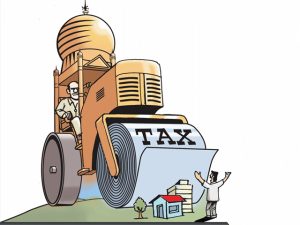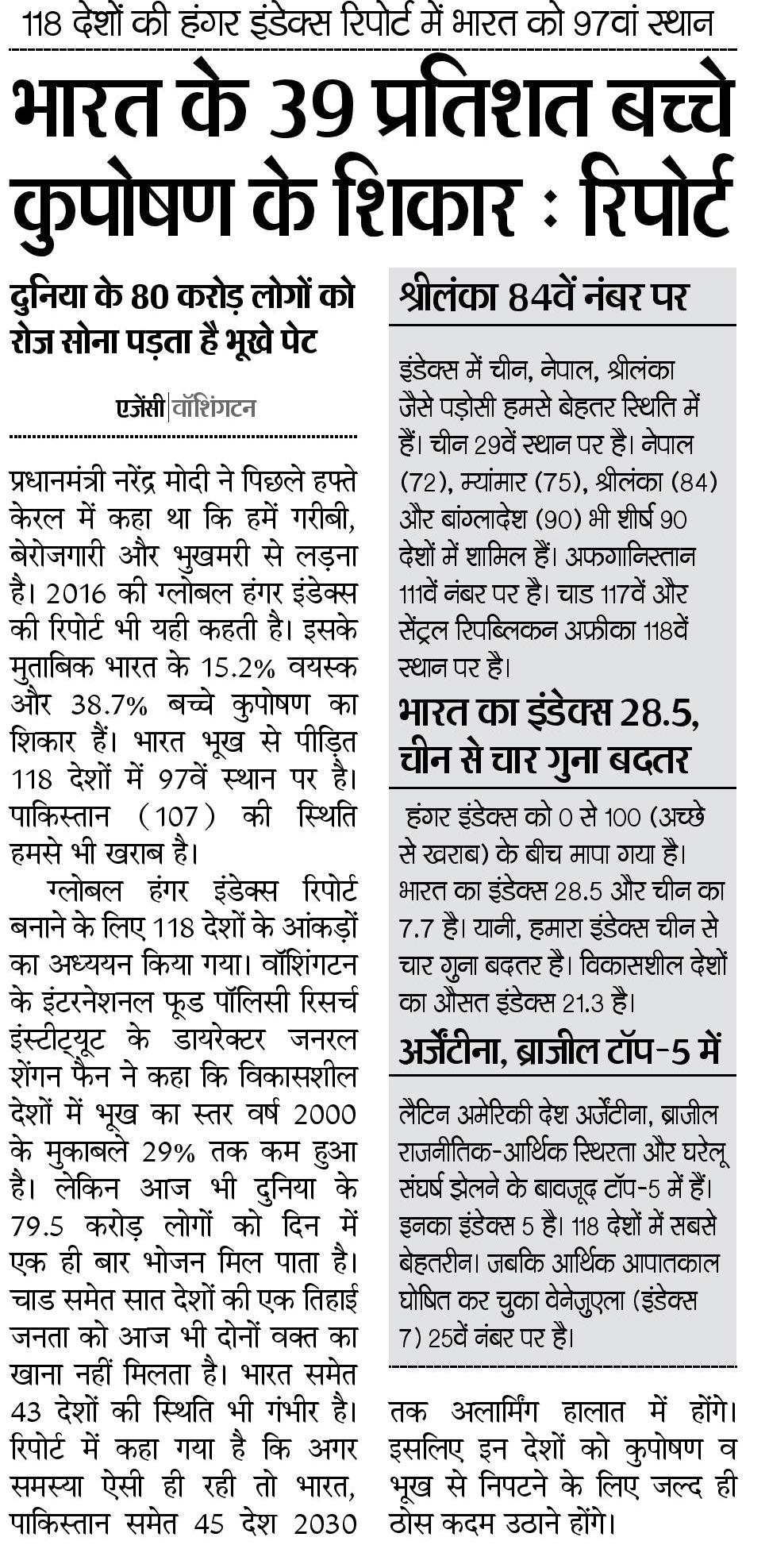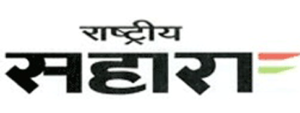
13-10-2016 (Important News Clippings)
To Download Click Here
Let us not spiral into tax terrorism
The income-tax department is reportedly on an overdrive to nab tax evaders. Punitive action against non-disclosure should be in consonance with the existing income tax law.The department has started quizzing people on transactions older than the six-year time-limit stipulated for scrutiny under the income-tax law, apparently taking shelter of the income disclosure scheme that allowed aperson to declare undisclosed income beyond six years.This is extremely unfortunate and will result in harassment of the middle class.
The super-rich, who generously fill the coffers of our politicians and political parties, whose income and expenses are exclusively in black money, will obviously be immune to the taxman’s excavative enthusiasm.Disputes will mount and demands will turn vicious, to be dubbed tax terrorism. Fishing expeditions must end. Not all foreign accounts and foreign-registered companies have illicit money or business.To establish audit trails, the department must push for effective information-sharing with tax havens such as British Virgin Islands that have reportedly registered companies and trusts — where ownership details do not have to be filed.Audit trails also hold the key in a globalised economy where multinational companies undertake complex transactions to escape taxes.
Automatic sharing of information among countries from next year will make it easier for governments to track these transactions. Nevertheless, like Britain, India should create a unique legal entity identifier to make companies identify their beneficial owners, and make the registry public.The focus must be on preventing generation of black money, through systemic changes and optimal use of information technology.The goods and services tax, once implemented, will generate multiple audit trails to undeclared production and income. New data analytics that can glean intelligence from unstructured, real-time data as well as from structured data will empower the taxman. India also needs to overhaul its tax system to widen the base, lower tax rates.
सार्क से पहले पाक को तैयार करना होगा अपना विकल्प
सार्क सम्मेलन स्थगित होने से आहत पाकिस्तान ने उसका विकल्प तैयार करने के लिए न्यूयॉर्क में राजनयिक प्रतिनिधिमंडल भेजकर यह जता दिया है कि वह दबाव के बावजूद भारत से वार्ता के लिए तैयार नहीं है। उसे यह भी पता है कि सार्क के मौजूदा ढांचे में भारत का ही दबदबा रहेगा, इसलिए उसे इससे बाहर निकलने की जरूरत है। उसे उम्मीद है कि वृहत्तर दक्षिण एशिया की अवधारणा को मूर्त रूप देने में उसे चीन और ईरान का सहयोग प्राप्त होगा। उसमें मध्य एशिया के कई गणराज्यों की भागीदारी होने से उस संगठन को सार्क से ज्यादा अहमियत मिल जाएगी।निश्चित ही भारत के अमेरिका से नज़दीकी बढ़ाने और सैन्य समझौता करने से चीन और उससे भी ज्यादा रूस आहत है। रूस लंबे समय से भारत का सामरिक साझीदार रहा है और भारत के रक्षा सौदों का बड़ा हिस्सा उसे मिलता रहा है, वह अब पाकिस्तान से सट रहा है। ऐसे में संभव है कि रूस नई राजनयिक पहल में पाकिस्तान को सहयोग दे। ऐसे किसी नए गठबंधन से चीन को भी फायदा होगा। किंतु अगर पाकिस्तान यह सोचता है कि वृहत्तर एशिया में शामिल होने वाले अफगानिस्तान जैसे देश भारत का विरोध करेंगे तो यह उसकी गलतफहमी है। मध्य एशिया के भी तमाम देशों के भारत से अच्छे रिश्ते हैं और वे पाकिस्तान से आर्थिक सहयोग भले कायम करें पर भारत का विरोध नहीं करेंगे। अस्सी के दशक में जब सार्क का गठन हुआ था तब से अब तक वह सांस्कृतिक व वैज्ञानिक सहयोग कायम करने वाला एक प्रकार का गैर-सामरिक-आर्थिक संगठन ही है। उसका उद्देश्य आठ सदस्यीय देशों में न सिर्फ सामूहिक आत्म-निर्भरता पैदा करना है बल्कि उन देशों की आर्थिक वृद्धि को गति देना है।सार्क हर व्यक्ति के गरिमामयी जीवन के लिए भी काम करने का संकल्प करता है। किंतु पाकिस्तान की सरकारें और फौज इन उद्देश्यों से इतर कामों में ज्यादा लगी रहती हैं। उनकी फौज सामरिक और राजनीतिक कामों में तो सक्रिय रहती ही है, वह गैर-सरकारी किरदारों (आतंकियों) को भी इसमें लगाए रहती है। सवाल है कि क्या नया संगठन पाकिस्तान की इन गतिविधियों का समर्थन करते हुए आर्थिक विकास कर पाएगा? जाहिर है नए संगठन के माध्यम से अपने आर्थिक विकास का खाका तैयार करने से पहले पाकिस्तान को पुराना रवैया छोड़ना होगा। पर क्या वह नया रूप धरने या अपने विकल्प के लिए तैयार है?
Date: 13-10-16
HIV Bill offers steps to end discrimination and ensure equality for affected groups
The HIV Bill is much needed, premised on a rights-based approach and on the assumption that to ensure the rights of all members of society, the rights of PLHVI have to be protected

Second, the government amended the draft Bill to remove the protection to the Lesbian, Gay, Bisexual, Transgender and Intersex (LGBTI) community. The protection to the LGBTI community was included in the draft Bill as it is understood that it is because of their vulnerability and lack of protection for them in the law that HIV also spreads. It is not known what decision the government has taken on this issue. That will be known only when the HIV Bill approved by the cabinet is made public. Nevertheless, the approval by the cabinet of the Bill is a milestone, which must be welcomed. The Bill has had a tortuous journey for over 10 years, shuttling between health and other ministries, apart from being kept in limbo in the law ministry for a long period.There are about 21 lakh PLHIV in India. Despite the fact that new infections are going down, the total number of PLHIV will not decrease significantly for the next few decades. Further, despite all the sensitisation on the issue, PLHIV are routinely discriminated against. So, the HIV Bill is much needed, premised on a rights-based approach and on the assumption that to ensure the rights of all members of society, the rights of PLHVI have to be protected.The Bill is significant in numerous ways. Apart from the fact that it provides for measures relating to discrimination against PLHIV, it is the first time that the law will address discrimination in the private sector. The Constitution provides for addressing discrimination in the “state” sector.However, it is the private sector where discrimination is rife, whether in health, employment, education, renting property, insurance, standing for office or otherwise. The Bill tackles that. On PLHIV becoming known, they are often thrown out of their households. The HIV Bill provides that a PLHIV under 18 years has the right to reside in a shared household.
The Bill also recognises the autonomy of PLHIV in terms of testing and treatment and provides for consent for the same as also for confidentiality on testing. No person can be compelled to disclose his or her status except with informed consent or by an order of a court of law. Entities disclosing the status of PLHIV would be liable under the Bill.Another first is a creative measure for redressal in case of denial of treatment to a PLHIV person, both at the institutional level and at the local district level. Discrimination is rife in the health sector, especially in surgeries involving PLHIVs. If the surgery required is not done immediately, a PLHIV can first approach the appropriate authority in the health care facility which is mandated to address the issue in a time-bound manner.This would, over time, tone the health facilities to respond to complaints. If that fails, the PLHIV can approach the local ombudpersons, mandated to give directions to the health facility to provide the required treatment, even on an emergency basis and/or in a time-bound manner.Ombudspersons are required to be set up at the district level to allow for grievances to be redressed.
No law can mandate a healthcare worker to provide treatment when undertaking the procedure would be a risk without safety measures, like provision of gloves, addressed for the worker. This often results in denial of treatment of PLHIV. The HIV Bill, for the first time, mandates the authorities to provide a “safe working environment” to healthcare workers. Only with that kind of environment will doctors not hesitate to treat patients who would otherwise pose a significant risk to them.Most importantly, the HIV Bill is a result of numerous consultations with all the communities affected by HIV and other stakeholders, within and out of government, standing together to prevent the spread of HIV. The success of the Bill is partly guaranteed because of the PLHIV community, which has the highest stake, has been involved at each turn the Bill has taken. When it becomes law, the HIV Bill will not suffer for lack of persons pushing its implementation. However, its success will have far-reaching impacts on other health legislations that need to be enacted.
Anand Grover
(This article first appeared in the print edition under the headline ‘A Bill for better health’)
समावेशी खेती की शत्रे
मौजूदा केंद्र सरकार की बात करें तो यह वर्ष 2022 तक किसानों की आय बढ़ाकर दोगुना करने का दावा कर रही है। इसकी तह में जाकर देखें तो यह सिर्फ कागजी नारा है। इस दिशा में अभी तक ऐसा खाका तैयार नहीं किया गया है, जिससे उनकी आय में इजाफा हो। फसल बीमा योजना और ई मंडी की व्यवस्था सिर्फ कागजों में ही अच्छी दिख सकती है
देश में अभी तक जितनी भी सरकारें बनी हैं सभी ने किसानों के कल्याण के लिए बड़े-बड़े दावे तो किए। लेकिन कृषि के समावेशी विकास के बारे में किसी ने गंभीरता से चिंता नहीं की। कृषि से जुड़े छोटे-छोटे मुद्दे तो समय-समय पर उठते रहे। मगर स्थायी एवं समग्र समाधान के बारे में कोई बात नहीं करता। किसानों से जुड़ी समस्या की जब भी कोई बात उठी उसका तात्कालिक एवं आंशिक समाधान पेश करने की कोशिशें की जाती रहीं। यह स्थिति तब और गंभीर बन जाती है जब विश्व बैंक, अंतरराष्ट्रीय मुद्रा कोष और संयुक्त राष्ट्र समेत तमाम नियंतण्र शीर्ष संस्थान कृषि की उपेक्षा के प्रति आगाह करते रहे हैं। इन संस्थानों की समय-समय पर जारी होने वाली रिपोटरे में एशियाई प्रशांत क्षेत्र में गरीबी के लिए मुख्य तौर पर कृषि के पिछड़नेपन को जिम्मेदार ठहराया जाता रहा है। भारत जैसे कृषि प्रधान देश में तो यह चिंता और भी ज्यादा गंभीर हो जाती है। हैरानी की बात यह है कि इतना गंभीर मसला होने के बावजूद इस बारे में केंद्र की किसी भी सरकार के दृष्टिकोण में कोई अंतर नहीं आया। यह चिंता का विषय है। इस समस्या को समझने में जितनी देरी की जा रही है, यह उतनी ही ज्यादा गंभीर होती जा रही है। यदि अतीत के पन्ने पलटें तो वीपी सिंह के नेतृत्व वाली जनता दल सरकार में खेती-किसानी के कल्याण के लिए कुछ जमीनी कवायद की गई थी। चूंकि तत्कालीन कृषि मंत्री देवीलाल खुद किसान थे इसीलिए उन्हें इससे जुड़ी तमाम समस्याओं का मूल पता था। इस अल्पावधि की सरकार में भानुप्रताप, शरद जोशी और एच. हनुमंतप्पा की अगुवाई में तीन समितियां गठित की गई। इन समितियों ने कई ठोस और प्रभावी नीतियों पर काम किया। तब वाकई लगा था कि खेती-किसानी के दुर्दिन दूर हो जाएंगे। जैसे ही इस दिशा में काम आगे बढ़ा दुर्भाग्य से यह सरकार गिर गई और इसके साथ ही कृषि के विकास का सपना टूट गया। इसके बाद जितनी भी सरकारें आई; उन्होंने जिन किसानों के पास जमीनें हैं उनकी समस्याओं पर तो र्चचा की। किंतु इससे भी ज्यादा संख्या में खेतीबाड़ी से जुड़े लोगों के बारे में कोई र्चचा नहीं की गई। यदि हमें कृषि क्षेत्र के ढर्रे को वाकई में बदलना है तो इससे जुड़ी मूल समस्याओं की तह में जाना होगा। बानगी के तौर पर वर्ष 2013 में बासमती चावल की पूसा 1121 और 1509 किस्में काफी र्चचा में रहीं। तब किसानों को बाजार में पूसा 1121 के 4800 रुपये और पूसा 1509 धान के 3500 रुपये प्रति क्विंटल के दाम मिले। अगले वर्ष किसानों ने इसकी उपज बढ़ा दी तो इनके भाव क्रमश: 3500 और 2200 रुपये पर आ गए। कीमतों पर गिरावट का रुख इससे अगले वर्ष भी जारी रहा। वर्ष 2015 में यह भाव लुढ़क कर 2200 और 1200 रुपये के स्तर पर आ गए। हालत यह रही कि किसानों को इस धान का कोई खरीदार ही नहीं मिला, जबकि आम मोटा धान 1550 रुपये प्रति क्विंटल के न्यूनतम समर्थन मूल्य खरीदा गया। जब किसानों ने दबाव बनाया तो सरकार ने बासमती धान को मोटे धान की दर पर खरीदने का फैसला किया। हैरानी की बात यह है कि इस फैसले को लागू होने में डेढ़ महीने का समय लग गया। क्या सिर्फ खेती पर निर्भर कोई किसान अपनी फसल बेचने के लिए इतना इंतजार कर सकता है? कतई नहीं। हकीकत यह है कि उसे फसल आने से पहले ही पैसे की जरूरत होती है। इसी वजह से ज्यादातर किसानों को अपना बासमती धान औने-पौने दामों में बेचना, जबकि उपभोक्ताओं को अच्छा बासमती चावल 80 रुपये प्रति किलोग्राम की दर पर ही खरीदना पड़ा। कहने का आशय यह है कि हम खेती से जुड़ी समस्याओं का आखिर स्थायी समाधान क्यों नहीं ढूंढते? इसी तरह सरकार की गलत नीतियों के कारण पिछले साल मूंग, अरहर और उड़द की दालों के भाव 150 रुपये प्रति किलोग्राम के स्तर पर पहुंचे उसने दलहन के एमएसपी में अच्छा-खासा इजाफा कर दिया। सरकार की इस नीति से आकर्षित होकर किसानों में दलहन की खूब फसल उगाई। अब मूंग की नई फसल तैयार हो गई तो इसकी खरीद के लिए उपाय नहीं किए गए हैं। किसानों को मजबूरी में यह फसल एमएसपी से काफी कम दामों पर बेचनी पड़ रही है, जबकि बाजार में मूंग की दाल के भाव अब भी ऊंचे बने हुए हैं। आखिर यह कैसी व्यवस्था है, क्या इससे कृषि और किसानों का भला हो पाएगा? इस बारे में गंभीरता से विचार करने की जरूरत है। एक तरफ तो सरकार किसानों से खेती के विविधीकरण की ओर रुख करने की सलाह दे रही है दूसरी ओर मक्का, ज्वार, बाजारा, सरसों समेत मुख्य तौर पर कुल 24 जिंसों में से सरकारी स्तर पर सिर्फ गेहूं और धान की एमएसपी पर ही खरीद सुनिश्चित की जाती है। यही कारण है कि प्याज, लहसुन, टमाटर आलू और दलहन की बंपर फसल होने पर बाजार में इनका कोई खरीदार नहीं मिलता। इस तरह की नीतियों से कृषि के समग्र विकास की कतई उम्मीद नहीं की जा सकती जबकि मलयेशिया, थाईलैंड जैसे देश कृषि के विकास के जरिए आगे बढ़ रहे हैं।मौजूदा केंद्र सरकार की बात करें तो यह वर्ष 2022 तक किसानों की आय बढ़ाकर दोगुना करने का दावा कर रही है। इसकी तह में जाकर देखें तो यह सिर्फ कागजी नारा है। इस दिशा में अभी तक ऐसा कोई खाका तैयार नहीं किया गया है, जिससे किसानों की आय में इजाफा हो। फसल बीमा योजना और ई मंडी की व्यवस्था सिर्फ कागजों में ही अच्छी दिख सकती है। दुर्भाग्य यह कि किसान मुद्दों के आधार पर वोट नहीं करता। सर्वविदित है कि कृषि में निवेश से सबसे ज्यादा रोजगारों का सृजन होता है फिर भी इस ओर गौर नहीं किया जाता। यदि सरकार कृषि क्षेत्र का वाकई विकास करना चाहती है तो उसे असिंचित पड़ी 58 फीसद कृषि भूमि के लिए सिंचाई के संसाधन मुहैया कराने होंगे। यदि इस मोर्चे पर आधी सफलता भी मिल जाए तो इससे खेती-किसानी का कल्याण तो होगा ही गरीबी भी काफी हद तक दूर हो सकती है।




